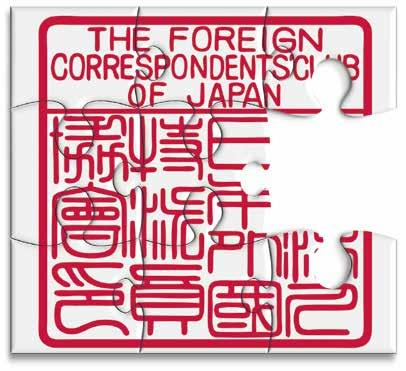Issue:

On April 1 the FCCJ embarked on a new chapter in its history as a koeki shadan hojin, or a public-interest incorporated association. The Club’s new Articles of Association and Bylaws took effect simultaneously on that date.
There are a number of changes that will affect the operation and governance of the Club, and the rights and responsibilities of Club members. Under our old rules, for example, a General Membership Meeting (GMM) resolution had supreme authority in the Club’s decision-making. In other words, the Board of Directors had to obtain the general membership’s approval on almost all decisions it made; any Board decision could be overturned at a general meeting as well.
This is no longer true.
The Club’s governance and operations are now under the Act on General Incorporated Associations and General Incorporated Foundations, or the Shadan Hojin Law, which governs both general and public-interest incorporated associations and foundations. As explained at various Club meetings, the Shadan Hojin Law is based on the Kaisha-ho, or Companies Act. This means, from now on, our general meeting will be equivalent to a corporate shareholders meeting.
Certain matters are to be resolved at the GMM, but most of the operational decisions are now left to the Board of Directors. In other words, the Board now has much stronger powers and heavier responsibilities than it had under the old rules. As a result, the Kanji’s role has become critical.
The Directors and (one or two) Kanji will be elected by resolutions at a GMM, which is why we needed to change our election procedures. The President and other senior officers will then be selected from among members of the Board by resolutions at a Board meeting.
You can find all these changes stipulated in the new Articles and Bylaws on our website. But here’s a brief explanation of the major changes, especially in the general meeting procedures and the process to elect the Directors and the Kanji.
GENERAL MEMBERSHIP
MEETING CHANGES
The Club will hold at least two GMMs a year with the annual general meeting in June and another regular GMM in March in order to approve the budget and business plan. In addition, an extraordinary GMM may be held at any time as needed.
In the new system, a quorum requires one-half of the general membership, whereas it has been one-fifth of the general membership for many years.
This is a major challenge for us, as it requires a lot of involvement of our members. So just as is widely practiced at corporate shareholders meetings, the FCCJ Board will send out a GMM agenda to all Regular members, including detailed information on all the proposed resolutions, no less than two weeks before the meeting. A reply sheet and/ or postcard will be included in the package, so that Regular members who aren’t able to attend the meeting may vote on the issues in advance, using written or electronic methods, or designate another Regular member as a proxy to exercise their voting right.
Regular members who are unable to attend the GMM may also designate the Chair of the meeting as their proxy. This is a new device, primarily for the purpose of constituting a quorum. The Chair, however, must cast these proxy votes in accordance with the proportion of “yes” and “no” votes cast by physically attending members and absentee ballots for the respective agenda item. This means the Chair cannot go against the wishes of the majority.
Incidentally, Regular members may cast a maximum of two proxy votes; this hasn’t changed.
There is another significant change regarding “New Business” items, or resolutions proposed on the spot from the floor. We no longer can adopt a resolution that is not proposed in the agenda. This is in accordance with the law to ensure informed discussions in our decision making process, as well as to prevent attempts by a small group of Regular members in attendance to make a Club decision in a precipitous manner.
The agenda of the GMM will be set by the Board. But as stipulated in the Bylaws, the Board is obliged to add an item to the agenda if a signed request is made by at least one-thirtieth of the general membership no less than six weeks before the GMM. That means, for example, if the number of Regular members is 300, as few as 10 members could add an item to the agenda.
Similarly, to make an amendment to a proposed resolution and have it distributed to Regular members before a GMM takes place, at least one-thirtieth of the general membership must submit a signed petition to that effect no less than one week before the meeting.
An amendment to a proposed resolution may still be made from the floor at a GMM. But from now on it will need the approval of a majority of all attending members, including absentee votes and proxies. This means that such amendments will have a higher hurdle to clear, as absentee Regular members will not be able to vote on the amendment, even though they are included in the number of attendees for vote counting on any resolution.
THE NOMINATION PROCESS
The President establishes an Election Committee consisting of at least three Regular members, preferably former Board members, no less than six weeks before the annual GMM in June. The Election Committee’s role will be basically the same as before.
Nominations in writing for all candidates should be submitted to the Election Committee no less than three weeks before the GMM. The nominations won’t be valid unless the nominee has consented in writing to run for office. Candidates for elective office must have held a membership card for at least one full year prior to his or her nomination.

For Directors, there must be at least eight nominees from Regular members and four nominees from Professional Associate and Associate members. For Kanji, there must be at least two nominees from Regular members. In the event the Club decides to have more than one Kanji, the second Kanji shall come from Professional Associates and Associate members and there shall be at least two Kanji nominees from Professional Associate or Associate members.
The nomination of each Regular member candidate must have the signatures of at least two Regular members. Self-nomination requires the signatures of at least two other members endorsing the nomination. At least six of these candidates for Directors will be elected, along with one or two as reserve Directors, with the ranking based on their respective number of votes. At least one of these candidates for Kanji will be elected along with another as reserve Kanji.
The nominations of candidates from among the Professional Associate and Associate members shall be made through the Associate Members’ Liaison Committee (AMLC) in accordance with the guidelines established by the AMLC and agreed to by the Board. At least three of these candidates for Directors will be elected along with one or two elected as reserve Director(s). In the event the Club decides to have more than one Kanji, at least two of these candidates for Kanji will be elected, one as Kanji and another as reserve Kanji.
The deadline for nominations may be extended for a maximum of five days if the Election Committee does not receive enough nominees for Directors and Kanji(s) to hold an election by the aforementioned date.
The Election Committee must notify the Board of a list of candidates at least three weeks before the annual GMM to ensure that the Board can announce the candidates’ names and affiliations to all Regular members at least two weeks before the meeting. The list should be included in the meeting agenda.
ELECTION CHANGES: THE VOTE
The election of Directors and Kanji will be held at the annual GMM, and a ballot sheet will be handed to each Regular member as he or she arrives and signs in for the meeting.
Each Regular member may vote for eight Regular member candidates and four Professional Associate or Associate member candidates for Directors, and two candidates for Kanji unless the number of Board and Kanji positions has been set otherwise at an earlier general meeting. Regular members should mark their ballots and deposit them in the ballot box before the meeting is called to order.
A Regular member who is unable to attend the annual GMM may cast his or her absentee ballot by post, fax or email in accordance with the procedures established by the Election Committee, listing his or her choice of candidates.
The six Regular member candidates and the three Professional Associate or Associate member candidates with the largest numbers and a majority of votes cast will be elected as Directors (unless the number of Directors has been set otherwise at an earlier GMM). Similarly, the Kanji candidate(s) with the largest number(s) and a majority of votes cast shall be elected as Kanji(s). In case of a tie, the candidate(s) with the longest cumulative active membership shall be declared elected.
The newly elected Directors and the Kanji will take office at the end of the annual GMM and immediately elect the President, Vice Presidents, Secretary and Treasurer. The terms of Directors expire at the end of the annual GMM the following year. The term of the Kanji expire at the end of the annual GMM two years later.
Those are the changes in the new Articles and Bylaws that will affect Club members. I highly recommend that everyone read them carefully to understand their rights as well as their responsibilities (Section 10 of the Bylaws deals with the election process). They are posted on our website under “About FCCJ.”
Kazuo Abiko, former AP general manager for Northeast Asia based in Tokyo, was FCCJ president in 2001-02. He is co-chair of the Shadan Hojin Panel.

